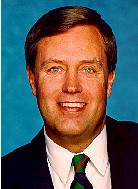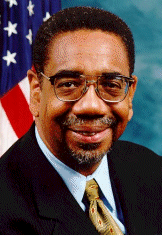
Oxley (R-OH)
House Passes Bill to Restrain FCC on Low Power FM
(April 13, 2000) The House passed HR 3439, the Radio Broadcasting Preservation Act, by a vote of 274 to 110 on Thursday evening, April 13. The bill restricts the FCC's authority to issue low power FM licenses.
| Related Documents |
| HR 3439 RH, Radio Broadcasting Preservation Act. |
| Barrett Amendment (rejected). |
| FCC Lower Power FM Order, 1/20/00. |
| Furchtgott-Roth Dissent, 1/20/00. |
The Federal Communications Commission adopted an Order on January 20, 2000 which created two new classes of noncommercial low power FM radio (LPFM) licenses. It authorizes stations with power from 50-100 watts and a service radius of about 3.5 miles, and with power from 1-10 watts and a service radius of about 1 to 2 miles.
The FCC Order was adopted on January 20, and released on January 27. The Commission adopted the Order by a 3 to 2 vote. Commissioner Harold Furchtgott-Roth wrote a dissent in which he stated that "such action harms existing license holders and their listeners, while producing very little in the way of countervailing benefits." (See, MM Docket No. 99-25.)
The FCC contemplates that these LPFM licenses will be utilized by minorities, community groups, and churches.
Many members of Congress reacted unfavorably to the FCC's rule making proceeding. Some argue that the FCC exceeded its statutory authority. But more significantly, many believe that the new stations will interfere with existing stations.
 |
|
| Rep. Mike Oxley (R-OH) |
Rep. Mike Oxley (R-OH) introduced HR 3439 on November 17, 1999. The original version of the Oxley bill would simply have prevented the FCC from instituting LPFM licenses. The bill was marked up by the House Telecom Subcommittee on March 23, and by the full Commerce Committee on March 29.
HR 3439 RH, the bill adopted by the Commerce Committee, allows low power radio to proceed for 70 licenses that clearly do not interfere with existing stations, provides for implementation in some test markets, and requires the FCC to conduct a pilot study on the effect of low power radio in those markets.
The FCC's LPFM Order is strongly opposed by the National Association of Broadcasters (NAB) on the grounds that new low power stations will create interference with existing stations, and decrease the quality of programming for listeners. Broadcasters are concerned about static, crosstalk, and hums.
Joy Howell, Director of the FCC's Office of Media Relations, told Tech Law Journal before the vote that broadcasters are concerned about competition, not interference, from low power FM stations.
| 18 U.S.C. § 1913 |
| "No part of the money appropriated by any enactment of Congress shall, in the absence of express authorization by Congress, be used directly or indirectly to pay for any personal service, advertisement, telegram, telephone, letter, printed or written matter, or other device, intended or designed to influence in any manner a Member of Congress, to favor or oppose, by vote or otherwise, any legislation or appropriation by Congress, whether before or after the introduction of any bill or resolution proposing such legislation or appropriation; ; but this shall not prevent officers or employees of the United States or of its departments or agencies from communicating to Members of Congress on the request of any Member or to Congress, through the proper official channels, requests for legislation or appropriations which they deem necessary for the efficient conduct of the public business. Whoever, being an officer or employee of the United States or of any department or agency thereof, violates or attempts to violate this section, shall be fined under this title or imprisoned not more than one year, or both; and after notice and hearing by the superior officer vested with the power of removing him, shall be removed from office or employment." |
The antagonism between the FCC and many Members of Congress on this issue is intense. The FCC directly lobbied Members of Congress to oppose the bill. Rep. Billy Tauzin (R-LA), the Chairman of the House Telecom Subcommittee, and a floor manager of the bill, started the floor debate by stating that he would ask the Department of Justice to conduct a criminal investigation of the FCC's use of public funds to lobby Members of Congress in violation of 18 U.S.C. § 1913. Rep. Oxley also condemned the FCC lobbying activities as illegal.
Rep. Tauzin then criticized the FCC for adopting its LPFM Order. He stated that "the FCC has proceeded full steam ahead to provide this service" in the face of Congressional concerns regarding interference created by these new stations.
"There is enough evidence against the FCC's actions to be concerned," said Rep. Oxley. He argued that the FCC should "have a pilot study done, and find out once and for all" whether there is interference.
Rep. John Dingell (D-MI), the ranking minority member of the House Commerce Committee, and the Democratic floor manager of the bill, also spoke in support of the bill. "The FCC has moved without any consideration of fact, or the scientific record," he said.
Rep. Bob Goodlatte (R-VA) spoke in support of the bill. He stated that industry studies show that interference would result in a "devaluation of the investment of existing license holders."
Rep. Goodlatte, who is Co-Chair of the Internet Caucus, also suggested that web sites and email would be a good way for community groups to communicate with their members.
Rep. Ed Markey (D-MA), spoke in opposition to the bill. He stated that "the most unhealthy part of the 1996 Act was the part that allowed for consolidation in the radio industry." He stated that this has resulted in much consolidation, and as a result, "it gets harder and harder for minorities to get access to the airwaves."
"The FCC has been doing a good job in sorting out these interference issues," said Rep. Markey added. "They have been doing it for 80 years."
Rep. Stephanie Tubbs Jones (D-OH) also spoke against against the bill. She argued that the number of radio station owners in decreasing, and that low power FM would allow minorities and community groups access to the airwaves. "Everyone should be able to reach the table, and they can do it by low power radio," said Rep. Jones.
 |
|
| Rep. Bobby Rush (D-IL) |
Rep. Bobby Rush (D-IL) praised LPFM and the FCC. He wants "all Americans to have access to the airwaves of this nation." Rep. Rush represents an inner city district on the south side of Chicago. He also sits on the Commerce Committee.
Rep. Al Wynn (D-MD), another member of the Commerce Committee, also spoke against the bill, as did Rep. Mel Watt (D-NC).
Rep. Thomas Barrett (D-WI), along with Rep. Rush, offered an amendment which would have substantially weakened the bill.
Rep. Barrett argued that "the President has told this body that he is strongly opposed to this bill, and he will veto it." However, the amendment was rejected by a vote of 142 to 245, and the bill was approved by a veto proof 274 to 110.